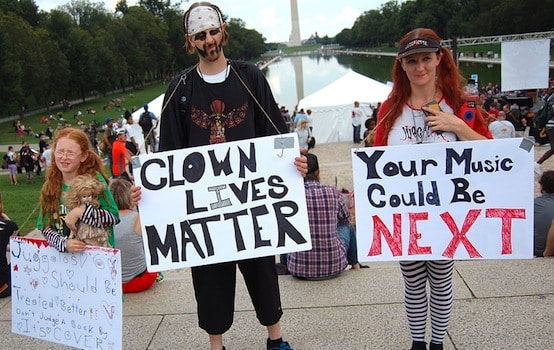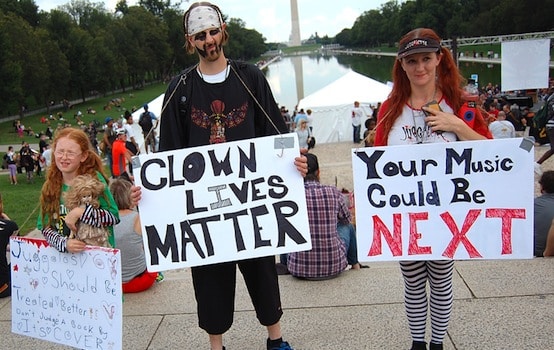
Should the feds be permitted to treat anyone who is not a choirboy like a criminal suspect? Unfortunately, local, state, and federal agencies have a long history of targeting, harassing, and entrapping fans of untraditional music. Because so many innocuous activities have become criminalized in recent decades, it has never been easier for the feds to tar any group they please. Precedents established against devotees of unruly music could be used in the future against peaceful libertarians.
From the 1930s onwards, the feds often went after jazz musicians in part because of their frequent use of marijuana — which was proscribed nationally by the Marijuana Tax Act of 1937. After the end of Prohibition, there were plenty of unemployed federal agents, and the launch of a new war — spurred by films such as Reefer Madness — provided full employment for meddlers with guns and badges.
In the 1980s and 1990s, the feds launched vendettas against Grateful Dead fans. Although the name “Deadhead” sounds ominous, Dead- heads tended to be aging hippies or naive college kids in ancient Volkswagen buses, lost souls who loved to talk about peace and nature and happiness and love. Cynics often joked that Deadheads should “Get a life!” Instead, the DEA acted as if Deadheads deserved prison sentences long enough to destroy their lives. Use of LSD — a hallucinogen — was widespread among Deadheads.
Between 1990 and 1994, LSD arrests tripled nationwide; most of those arrested were Deadheads. By 1994, roughly 500 Grateful Dead fans were serving terms for LSD violations in state prisons. Julie Stewart, director of Families Against Mandatory Minimums, observed, “In the last round of Grateful Dead concerts on the East Coast, there was a trail of people left in jail afterwards.” When the Dead played in Louisville in 1993, local police arrested 272 fans within two days. Some arrests resulted because police scouted campsites used by Deadheads and discovering 13 persons using marijuana.
Gene Haislip, DEA’s chief of LSD enforcement, told USA Today, “We’ve opened a vein here. We’re going to mine it until this whole thing turns around.” Yet, although federal agents are working ’round the clock to wreck hundreds of people’s lives with long prison sentences for selling speckles of LSD, LSD itself killed only three people in 1992, according to the federal National Institute of Drug Abuse. Far more lives were destroyed as a result of the Deadhead crackdown than as the result of using the drug.
The purge against the Deadheads was spurred by a peculiar perversion in federal drug-sentencing laws. These laws, known as mandatory minimums, dictate that a prison sentence be determined by the weight of drugs sold.
LSD is usually sold in sugar cubes or on blotter paper. Federal prosecutors count the weight of the sugar or paper as if it were pure LSD. (The LSD dose itself is usually smaller than a pinhead.) As a result, a person who sells a single cube of sugar — with only 50 cents’ worth of LSD — faces a mandatory five years in federal prison if convicted. Someone who sells five sugar cubes faces 10 years in prison. Stanley Marshall of El Paso, Texas, was arrested in 1988 for possessing less than a gram of LSD. But, since the drug was on 113 grams of paper, Marshall got a 20-year federal prison sentence.
But it wasn’t necessary to traffic in banned substances to end up in the slammer. Many busts occurred because undercover drug agents aggressively encouraged Deadheads to sell them illicit drugs. Even if someone casually referred an undercover federal agent at a concert to someone rumored to be selling drugs, the person could be convicted of being part of a conspiracy to distribute illicit drugs. Dennis McNally, the publicist for the Grateful Dead, groused, “It’s much easier to arrest some hippie kid than it is to walk into a crack den in the inner city, where somebody might open the door with a semiautomatic.”
>Juggalos
After lead singer Jerry Garcia died in 1995, the Grateful Dead faded away. But new bands have arisen that have raised the hackles of law enforcement, such as the Insane Clown Posse (ICP) — a white rapping duo out of the Detroit area. In 2011, a Federal Bureau of Investigation National Gang Threat Assessment tagged the Posse’s fans — known as Juggalos — as “a loosely-organized hybrid gang, rapidly expanding into many U.S. communities…. Many Juggalos subsets exhibit gang-like behavior and engage in criminal activity and violence.” But there were only sporadic reports of Juggalo-related criminality at that time. The FBI report noted, “Crimes committed by Juggalos are sporadic, disorganized, individualistic, and often involve simple assault, personal drug use and possession, petty theft, and vandalism.” Juggalos’ conduct was nothing remotely comparable to that of notorious gangs such as MS-13 or the Crips or Bloods.
The FBI report noted, “Social networking websites are a popular conveyance for Juggalo sub-culture to communicate and expand.” This may be the real source of the feds’ ire. It is understandable why the Juggalos would make law enforcement nervous. The band’s logo is the Hatchet Man. The band’s lyrics radiate homicidal hatred towards rednecks, anyone displaying a Confederate flag, and plenty of other targets. The pervasive profanity in ICP’s lyrics make George Carlin sound like a choirboy.
Though the band initially scoffed at the FBI gang designation, it quickly produced catastrophic results as Juggalos suffered “job losses, dismissal from military service, eviction, lost child custody and constant harassment” thanks to the Hatchet Man logo on their clothing, cars, or elsewhere. Shaggy 2 Dope, one of the band’s two singers, complained in August, “We have trouble booking tours now, because no one wants gang-related sh*t. And if you do book a tour, it’s next to impossible to get people to insure it, because it’s a gang rally.”
In 2014, the Michigan branch of the American Civil Liberties Union filed suit to overturn the gang designation, noting, “The Juggalos are fighting for the basic American right to freely express who they are…. Branding hundreds of thousands of music fans as gang members based on the acts of a few individuals defies logic and violates our most cherished of constitutional rights.” The case was initially dismissed by a judge, revived by an appeals court, and slapped down again, and is awaiting re-hearing by a federal appeals court.
As the evidence piled up of Juggalos’ lives being ruined by the federal smear, the band decided to conduct a march on Washington. This past September, thousands of Juggalos assembled in front of the Lincoln Memorial to protest the FBI gang label and to heartily cuss the government.
The ICP and their fans believe the feds are unjustly censoring them. As Violent J (Joseph Bruce), half of the ICP duo, told the Juggalos at the Washington rally, “Taking away someone’s opinion is no different than sewing a man’s bu**hole shut.” The Juggalos responded by shouting “whoop whoop!” (a trademark for the band’s supporters) and various snappy anti-FBI phrases unfit for a family magazine like this one.
The protest march stirred a torrent of support for the cause in the media, including National Public Radio and the Washington Post. A headline on one popular online site declared, “Juggalos have become the darlings of the left and the new face of anti-racist activism.” An Antifa crew showed up at their Washington rally with a banner emblazoned, GREAT LAKES ANTIFA. One team member held up a sign proclaiming “Nazi Lives Don’t Matter” (a tricky sentiment, when Antifa sometimes equates Trump supporters with Nazis). The group struck some menacing poses for photographers and then wandered off, perhaps to apply some clown face paint. But most of the attendees I spoke with were either unaware or nonsupportive of Antifa’s violent antics in Berkeley or Boston.
The rousting
Despite their tattoos, wacky hair styles, and violent slogans, the Juggalos at the rally were much friendlier than the typical attendees at a Washington formal dinner. As I was walking a mile from the nearest Metro stop to the event, I saw ahead a burly, long-haired 20ish guy wearing an oversized shirt with the slogan, “Merry F***in X-mas.” I asked if he was heading to the Juggalo event and he responded warily that he was. Maybe my press pass raised his defenses. It turned out he was from the distant Virginia suburbs and that his brother lived in my old hometown. I mentioned that that locale was originally known as “Helltown” and he replied, “It still is.” I said I had worked in the 1970s for the Virginia highway department heaving dead deer off the road and into the bushes near where his brother now lived.
That sufficed to open him up. He told me that his name was James and that he was not wearing any clown face paint because he had heard that Virginia considered that a misdemeanor. He said he had been continually hassled by the police. Last year, he was driving home from his job when a cop lurking in his suburban neighborhood pulled him over. James asked why he was pulled over — “and I could see that he was scanning my car looking for the pretext for having pulled me over.” The cop eventually noticed that James had a small Hatchet Man metal logo dangling from his rear-view mirror. James said that Virginia prohibits anything hanging from rear-view mirrors — though that pine-scented car air fresheners are understandably pervasive in much of the state. He related being handcuffed for no reason another time simply because he was suspected of gang affiliations.
Prior to the Washington protest, some conservative media outlets portrayed Juggalos as just another mob of violent leftists. Not this guy: he mentioned that he had a concealed-carry permit in Virginia but would never consider packing heat in the District. He was a big supporter of the National Rifle Association and was well aware of several recent firearm controversies. I asked if he considered himself at least somewhat of a libertarian. He replied, “I am my own person — I have my own beliefs.” James typified the nonpolitical nature of Juggalos at the event.
Juggalos are hopeful that the FBI will rescind its defamatory label. But the real problem is that, thanks to sovereign immunity, federal agencies can smear almost anyone or any group they please. Libertarians, constitutionalists, and gun-rights advocates have been defamed by reports from federal Homeland Security-funded Fusion Centers, which portrayed them as terrorist threats. Regardless of the lack of evidence for such charges, the allegation reverberates around the Internet and eventually is treated with deference, if not recognized as an Officially Revealed Truth.
If the feds can vilify Deadheads and Juggalos, it could be only a question of time before Washington also tars bluegrass fans or Phish followers. The issue is not whether freaky folks with too many tattoos get unfairly vexed by petty bureaucrats. The real issue is that federal agencies have no right to demonize Americans peacefully pursuing their own vision of happiness.
Reprinted with permission from Future of Freedom Foundation.

